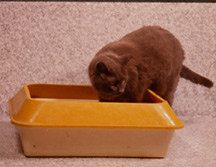
Smokey in the picture was about 19 at the time. Old cats with arthritis may have trouble climbing stairs or in/out of boxes and instead “go” somewhere else. Provide extra boxes to help them “do the right thing.”
This week I’ve got a theme going with poopy puppies last Wednesday and cat litter-ary problems today. And this week two of my cat behavior consults centered on problem toileting behaviors.
When you live with and love pets, you have to accept that a certain amount of crappiocca comes with the territory. That doesn’t mean you must LIVE with a spraying cat.
Here’s a few basics and refreshers for savvy cat owners, and maybe new information for first time fanciers. For those of y’all with Christmas kittens, take notes for the future and maybe prevent these problems in your furry wonders!
Spraying with urine is a marking behavior and typically is aimed at vertical objects. House soiling is urinating downward over horizontal surfaces. Each can have different causes, so to solve, you must figure out which it is.
House soiling very often has to do with 1) health problem, 2) the cat hating the box (for any number of reasons), 3) being prevented from “going” because other cats own the facilities. Cats faithful to the box that suddenly lapse need a vet check asap!
Boy kittens reach sexual maturity right around six to nine months, and then start advertising their hunk-icity by spraying urine like it’s kitty cologne. That drives the girl cats wild. Owners, too, but for different reasons.
Girl cats may also spray urine to advertise how cute they are to the feline Romeos once they go into heat (estrus) which can happen as early as four to five months!
Spay/neuter surgery removes the hormones that prompt as much as 85-90 percent of the spraying.
Even “fixed” cats may still spray or soil, especially in multicat households as part of jockeying for social position.
Cats use “self scent” (urine, cheek rubs and scratching) to calm themselves down during times of stress. So a cat may “tell off” that stray cat outside stomping on his lawn, or baptize your bed–because it smells like his beloved owner–when you’re gone on vacation.
This Ask Amy offers a few tips and advice for a spraying feline, but more details are available in the latest books ComPETability: Solving Behavior Problems in Your MultiCAT Household.
I know a lot of cat-savvy folks read this blog. What are some other reasons cats get creative outside of the box? Please share! (It may turn into another Ask Amy…)
I love hearing from you, so please share comments and questions. Do you have an ASK AMY question you’d like answered? Do you have a new kitten and need answers? Stay up to date on all the latest just subscribe the blog, “like” me on Facebook, listen to the weekly radio show, check out weekly FREE PUPPY CARE newsletter, and sign up for Pet Peeves newsletter. Stay up to date with the latest book give aways and appearances related to my THRILLERS WITH BITE!
Filed under:
Ask Amy Videos,
Cat Behavior & Care Tagged:
Amy Shojai,
Ask Amy,
cat house training,
cat spraying,
how to stop cats pooping outside of box,
litter box problems,
www.amyshojai.com


 newest »
newest »
 newest »
newest »
 Wow, your cat sounds gorgeous. Living in N Texas, with our share of coyotes, I'm glad you're keeping him safe.
Wow, your cat sounds gorgeous. Living in N Texas, with our share of coyotes, I'm glad you're keeping him safe.






And when my cat sprays, he almost always sprays in my room instead of anyone elses.